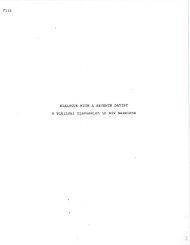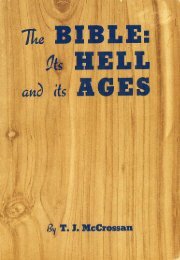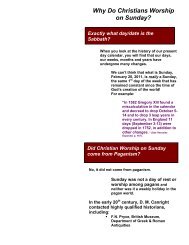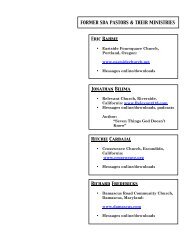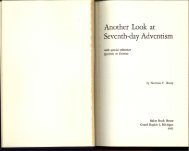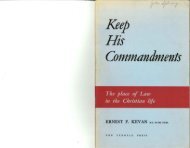Discovering the New Covenant by Greg Taylor - exAdventist Outreach
Discovering the New Covenant by Greg Taylor - exAdventist Outreach
Discovering the New Covenant by Greg Taylor - exAdventist Outreach
You also want an ePaper? Increase the reach of your titles
YUMPU automatically turns print PDFs into web optimized ePapers that Google loves.
66<br />
DISCOVERING THE NEW COVENANT<br />
The word Testament or <strong>Covenant</strong> means <strong>the</strong> same thing<br />
as a will, or some o<strong>the</strong>r legal contract. My wife and I have<br />
made out several wills during our marriage. We had a will<br />
before we had kids. We had a will made after <strong>the</strong> birth of our<br />
first child. We made ano<strong>the</strong>r after <strong>the</strong> second child, and<br />
recently we updated our will again. Now if we were to die in<br />
some tragedy, which will would be binding for our executor<br />
to follow? The most recent, or newest one, of course. The<br />
previous legal contract becomes null and void once <strong>the</strong> new<br />
one takes effect. That is why only <strong>the</strong> last will and testament<br />
is read and followed. There may be some carry over from<br />
one will to ano<strong>the</strong>r, but such carry over will always be<br />
stipulated in <strong>the</strong> new will. What does not carry over will not<br />
be specified in <strong>the</strong> new contract. The same thing would be<br />
true of financial contracts. We just finished refinancing our<br />
house. Our new agreement is for a lesser interest rate and<br />
with ano<strong>the</strong>r financing company. The purpose is <strong>the</strong> same. It<br />
allows us to make payments we can afford for a period of<br />
time in order to eventually own <strong>the</strong> house. Much of <strong>the</strong><br />
language in <strong>the</strong> new contract is <strong>the</strong> same. Many of <strong>the</strong> details<br />
are similar. But much is changed as well. Primarily, <strong>the</strong><br />
difference is in <strong>the</strong> interest rate, <strong>the</strong> fixed rate versus a<br />
floating rate. But <strong>the</strong>re are o<strong>the</strong>r details that differ as well.<br />
We do not send <strong>the</strong> check to <strong>the</strong> same company any more.<br />
Our obligations to <strong>the</strong> old organization have been satisfied<br />
<strong>by</strong> <strong>the</strong> new contract. We keep our old contract around for tax<br />
purposes, but it is no longer binding. That loan has been paid<br />
off <strong>by</strong> <strong>the</strong> new lending institution. Therefore we are free<br />
from <strong>the</strong> old contract and bound to <strong>the</strong> new.<br />
The same thing is true of <strong>the</strong> Old and <strong>New</strong> <strong>Covenant</strong>s.<br />
There are wonderful truths about God found in <strong>the</strong> Old<br />
<strong>Covenant</strong>. However, it is imperative that we remember that<br />
<strong>the</strong> <strong>New</strong> <strong>Covenant</strong> or Testament is <strong>the</strong> one that is binding.<br />
There is much history and background information that helps<br />
us understand God better. But to go first to <strong>the</strong> Old<br />
Testament for application of God’s will for our lives would



